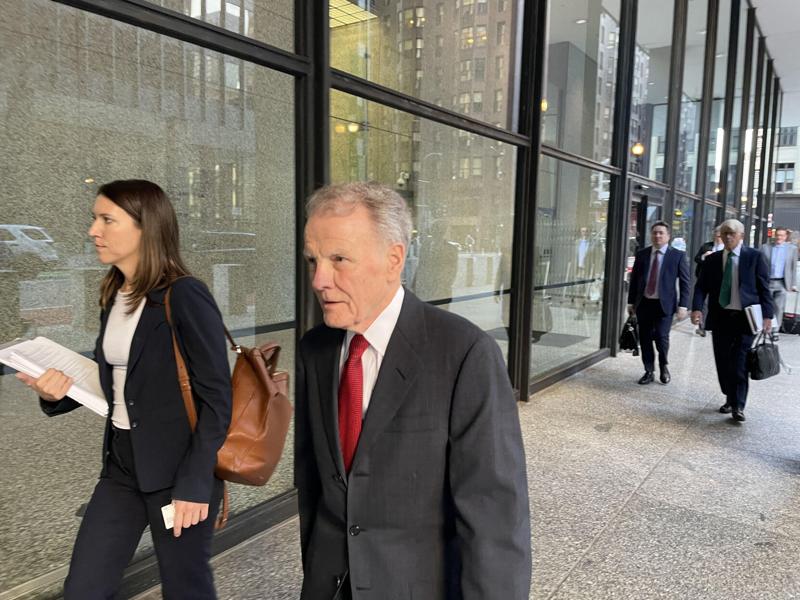Former Illinois House Speaker Michael Madigan was not an all powerful state politician who corruptly controlled Springfield, but an “incorruptible” man focused on serving his constituents, his defense team told jurors Monday.
Madigan’s defense attorney Thomas Breen told jurors in his opening statement that Madigan viewed his job as helping people. He wasn’t after power or money, as federal prosecutors have contended.
Breen said Madigan, 82, never used his position as speaker of the Illinois House for personal gain.
Prosecutors opened with a different description of Madigan. They described Madigan as the state’s most powerful politician who was only interested in accumulating power, rewarding those loyal to him with no-work contracts and other jobs that required little or no work.
“This is a case about corruption at the highest level of state government,” Assistant U.S. Attorney Sarah Streicker said during the prosecution’s opening statement.
She said the multi-year racketeering and bribery scheme that prosecutors allege was more sophisticated than cash in envelopes, but rather contracts disguised through third parties as lobbyists who rarely or never lobbied anyone. Streicker said Madigan used co-defendant Michael McClain to do his dirty work.
“When Madigan didn’t want his fingerprints on something, he assigned McClain to handle it,” she said.
Streicker said it was a job that McClain relished.
She also promised to present a case that jurors could see and hear, including playing 200 recordings for jurors over the course of the 11-week trial.
Breen said Madigan’s intentions and motives don’t track with the prosecution’s case.
“He’s not getting financial gain from his oath,” Breen said.
Breen also told the jury not to trust the cooperating witnesses that prosecutors plan to put on the stand during the trial, especially former Chicago Ald. Daniel Solis. Breen said Solis was trying to save himself after getting in criminal trouble with the FBI.
Breen also cast doubt on McClain’s role as Madigan’s messenger and doer of dirty work. Breen said Madigan never intended to make demands from anyone and that when McClain, who prosecutors described as “relentless,” said he was working on Madigan’s behalf, that wasn’t true.
“You are going to hear some out and out lies” from prosecution witnesses, Breen said.
Breen called McClain a friend and dinner partner of Madigan. He said Madigan sought advice from McClain, but Madigan never sent McClain to shake down state-regulated companies for jobs, contracts and political donations.
“They don’t have the authority to speak that way for Michael Madigan,” Breen said. “He doesn’t talk that way. He doesn’t act that way. He never made a demand on anyone.”
Judge John Robert Blakey spent most of the day overseeing the final selection of a twelve-person jury with six alternates before opening arguments started Monday afternoon.
Madigan served in the Illinois House from 1971 to 2021, as speaker from 1983 to 1995 and again from 1997 to 2021. That made him one of the state’s most powerful politicians, especially given his role as head of the Democratic party in the state. He faces 23 counts of racketeering, bribery and official misconduct. Madigan has pleaded not guilty.
In March 2022, Madigan and McClain were charged with 22 counts of racketeering and bribery for alleged improper dealings with the state’s largest utility, ComEd.
Prosecutors further allege that Madigan used his political power to unlawfully steer business to his private law firm, Madigan & Getzendanner. In October 2022, prosecutors filed a superseding indictment that charged Madigan and McClain with conspiracy related to an alleged corruption scheme involving AT&T Illinois.
The charges stem largely from Madigan’s dealings with the state’s largest utility, ComEd, along with another business, AT&T Illinois, that had wanted to influence legislation in Springfield.
In 2020, federal prosecutors and Exelon subsidiary ComEd reached a deferred prosecution agreement. As part of the agreement, the utility admitted it paid $1.3 million in jobs and contracts to associates of Madigan over nine years to influence the former House speaker. ComEd agreed to pay a $200 million fine. A former ComEd official, Fidel Marquez, pleaded guilty to bribery charges in September 2020.
A jury convicted four former ComEd lobbyists and executives in a bribery and corruption trial last year.






